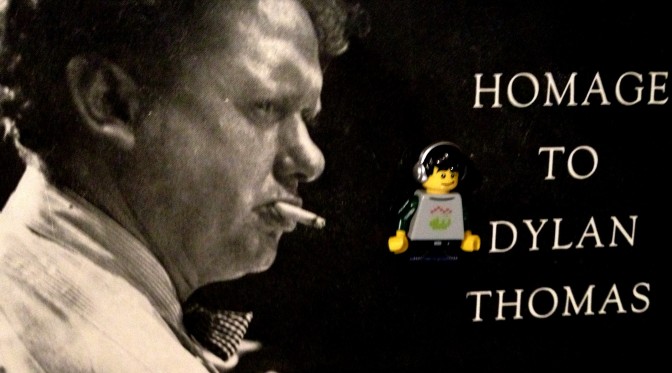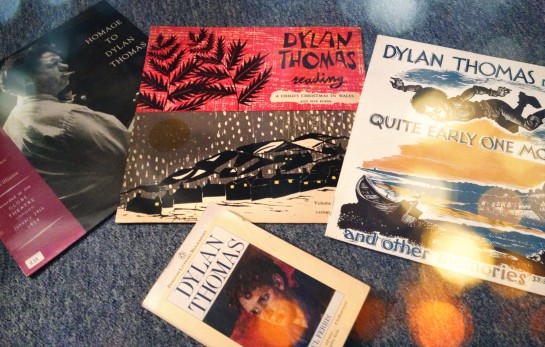Tonight’s featured artist was a wild man who rose up from a quiet provincial background to boldly blaze a bright trail of across the world, on the verge of breaking big in the States he ended up partying a little too hard on alcohol (and the morphine given to him for medical reasons) and dying of ‘an insult to the brain’ in New York’s Chelsea Hotel at the age of only 39. Sound familiar?
Dylan Thomas and I go way back. The area of Wales where I grew up was marketed to tourists as ‘Dylan Thomas Country’, Laugharne was about 15 miles down the road and many of his stories and scenes are set around, and reference, Carmarthen^. Funnily enough I don’t remember covering much of his work in school, apart from the story ‘A Visit to Grandpa’s’, until one day in a poetry comprehension class being given ‘A Refusal to Mourn the Death, by Fire, of a Child in London’ and being simply knocked out and baffled by it in equal measure.
Now I was always a bit of a whizz at poetry and I was very used to poems being puzzles that required a certain amount of decoding and I was always good at that, but I found large tracts of ‘A Refusal ..’ totally impenetrable. I was beat.
I had never, ever come up so short before, until Mrs Williams patiently explained to us that there were a) a lot of biblical references in the poem (which due to my staunchly atheistic upbringing I didn’t have the lexical toolkit to unpick) and b) it wasn’t meant to be completely reduced to meaning, it was meant to have some shady areas and grand lyrical vistas that would be, in another context entirely, evidence of Irreducible Complexity*. Dylan Thomas was being wilfully obscure for the sake and sound of it. I understood that bit.
Anyway to cut a long story short I got hold of a copy of an LP of the Richard Burton narrated 1953 production of Under Milk Wood and got seriously hooked, to the point where four years later I wrote my degree dissertation on cycles of rebirth and death in Dylan Thomas’ poetry. I also sketched out ideas for a play about his last days, to be called BurnBright – which sits somewhere unfinished, upstairs. He matters to me and not just because of geographical coincidence either. But we’re not here to talk about that one.
For Christmas 2007 my dad very kindly gave me three Dylan Thomas LPs that he had picked up at his antiques centre, A Child’s Christmas in Wales, Quite early One Morning and Homage to Dylan Thomas. All were in excellent condition and possibly 1950s originals, the first two titles on Caedmon Records and the latter on Decca. The first two collections of stories and poems are read by Dylan Thomas himself, the latter a recording of a celebration of his life, unsurprisingly, doesn’t but features the actors Richard Burton, Hugh Griffith and Emlyn Williams, alongside poet Louis MacNeice.
Caedmon records was formed by two 22-year-old female graduates who saw a market in spoken word records and blagged their way to lunch with him in the Chelsea Hotel, signed him as their sole act, was seen by Thomas as an easy way to make a fast buck, doing what he was in the US to do anyway, reading. It ended up making a lot of money for them and his estate.
First up, A Child’s Christmas in Wales. The headline act, as it were, is Dylan’s evocation and customarily exaggerated childhood, Christmas reminiscences. It’s funny, it’s charming and, as always with Thomas, the language is a joy. the sly juxtapositions of slightly incongruous compound adjectives that leave you there far quicker than any straight description could have,
‘All the Christmases roll down toward the two-tongued sea, like a cold and headlong moon bundling down the sky that was our street; and they stop at the rim of the ice-edged fish-freezing waves’
Despite featuring ‘Fern Hill’ and ‘Do Not Go Gentle Into that Good Night’, two of his most accessible, best-known and most powerful poems, both of whom I now associate with family funerals, this LP also includes three of his later, most obscure works, ‘In The White Giant’s Thigh’, ‘Ballad of the Long-Legged Bait’ and ‘Ceremony After a Fire Raid’. The first two of which are so dense and wilfully obscure, that you have to just listen to them for the sound of the language and lose yourself in the verbal extravagance; if you have the necessary receptor genes to do so.
One thing I find very interesting here is Dylan Thomas’ voice. Sent for elocution lessons from an early age by his father in an age where speaking with a ‘BBC accent’ was the way to get on in life, his voice is warm and plummy and comparatively accent neutral. From my point of view this is fascinating, for a poet so strongly identified with a region, and one with a strong distinctive accent at that. However I have to say that, popular radio performer that he was in the 1940s and 50s, my 1970s ears far prefer other more Welsh-sounding actors performing his works.
Quite Early One Morning is an interesting LP. ‘Quite Early …’ itself is basically an earlier draft of ‘Under Milk Wood’, a piece Thomas contemplated for years before being able to finish it, life with all its grubby financial necessities and warm-bosomed, ale-sopping sloppy distractions quite simply got in the way. If you know ‘Under …’, you’ll know the form, a journey through a small sleeping seaside town laying bare the comical obsessions and picturesque subconscious internal lives of its’ inhabitants. There is enough for a completist to enjoy here, but it is really a sketch, a work in progress compared to the magnificence of the finished item.
The other three pieces are again, childhood reminiscences – somewhat fictionalised again, the best of which is the hilarious ‘A Visit to Grandpa’s’ which features a denouement on Carmarthen bridge after Thomas goes to stay with his grandfather in Johnstown (where my school was). It is a criticism sometimes levelled at Thomas that this focus on childhood is too parochial, too cosy, a bit twee even but I think it needs to be borne in mind that a) it can be seen as a reaction to the horrors of WW2, a comfortable past used as a buttress against a disturbing present and b) it was popular and it paid – always a major concern for Thomas.
The final LP Homage to Dylan Thomas, dates from a performance from the Globe Theatre in London held 10 weeks after his death in New York. Louis MacNeice, another of my favourites, reads his ‘Requiem Canto’ and there is a brilliant take on ‘A Visit to Grandpa’s’, by Emlyn Williams**, but the words of Thomas aside, there is only one star here – Richard Burton. He reads my two favourite poems here, ‘Poem in October’ which I consider to be his absolute peak as a poet and ‘Fern Hill’, the poem of a rural childhood and childhood’s end which can make me weep like a baby if it catches me unawares. Sad sap that I am. Burton does them both right.
Dylan Thomas wasn’t a safe figure when he died, too wild and obscuritan for that, but that tends to be forgotten nowadays when I think the prevailing literary attitude tends to a trend towards patronising him as a woolly Welsh wind-bag, which I have to admit is not entirely wrong either. An interesting fact, an old gentleman by the name of Horatio who I knew as a drinker at the pub I worked in for a Saturday job when I was at school, The salutation Inn in Pontargothi, tells the tale of the driver of Dylan Thomas’ hearse breaking the journey to Laugharne there, popping in and having a pint while Thomas waited, horizontal, outside. I rather think he would have approved.
242 Down.
P.S – I hope I didn’t go on too much, it would be easy to forget that this is meant to be about some vinyl and I could have written a piece six times the length on Thomas without any problem, other than retaining your attention.
^it always amused me hugely that Thomas shared no such sentimentality about the region, referring to it as ‘This arsehole of the universe’ (in a letter of 1950 (quoted in Paul Ferris 1977 biography Dylan Thomas), a quote which does tend to be omitted from the tourist literature.
*okay so I stole the concept from Intelligent Design advocates, but it fits my fell purpose here; and I know it was rejected by scientists as being ‘an argument from incredulity’, which in that context I agree with but in 1537 it’s my rules suckaz!
**can you call someone doing someone else’s story a cover version?





Having lived in Llanelli for 8 years, I know all bout the work of this great poet. Even been to his house and work shed in Laughrne. Like Vinyl Connection says, it’s good to broaden the palette a bit.
Absolutely, I’d love a shed like that to blog in – not sure he was totally wi-fi enabled though!
He probably didn’t and that’s why he had to rely on the views for inspiration. They are some good views and I could probably write volumes if I had a shed like that.
The “arsehole of the universe” bit is one of the best postscripts on your blog yet.
Why thank you! I think the local tourist board really missed a trick there!
You’re just into swearing aren’t you?! Me too.
Pretty much! Coincidentally, after reading your post I went back to the Marc Bolan book I’m reading and it started discussing Dylan Thomas’ influence on Bolan! Freaky.
Always good to broaden the palette. I’m certainly up for some ale-sopping sloppy distractions. You buying?
Oh go on then!
Here in Denver, there was a period of six months where three theater companies did three different versions of Under Milk Wood and that changed me idea of what theater could be. First, the choices of the companies. One made a brick wall and fed the audience bread made on stage. Another had an artificial forest for the audience. Second though was a sense of poetry that sounded much more accessible than that Stratford-born fellow. DT made theater seem less stuffy.
Wow – so they do have culture in Denver? I thought it was just you.
We’re still reeling over that DT invasion of 15 years ago.